Sofosbuvir and Ribavirin for Treatment of Compensated Recurrent Hepatitis C Virus Infection After Liver Transplantation
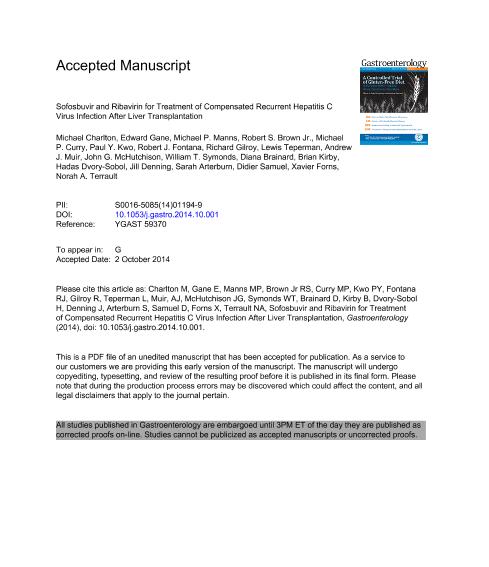
Background & Aims Interferon alfa–based regimens used to treat recurrent hepatitis C virus (HCV) infection after liver transplantation are poorly tolerated, associated with generally modest efficacy, and can interact with immunosuppressive agents. We evaluated the efficacy and safety of an interferon-free regimen of the nucleotide polymerase inhibitor sofosbuvir combined with ribavirin for 24 weeks in treating post-transplantation HCV infection. Methods In a prospective, multicenter, open-label pilot study, we enrolled patients with compensated recurrent HCV infection of any genotype after a primary or secondary liver transplantation. All patients received 24 weeks of sofosbuvir 400 mg daily and ribavirin starting at 400 mg daily, which was adjusted according to creatinine clearance and hemoglobin values. The primary end point was sustained virologic response 12 weeks after treatment. Results Of the 40 patients enrolled and treated, 78% were male, 85% were white, 83% had HCV genotype 1, 40% had cirrhosis (based on biopsy), and 88% had been previously treated with interferon. Sustained virologic response 12 weeks after treatment was achieved by 28 of 40 patients (70%; 90% confidence interval: 56%−82%). Relapse accounted for all cases of virologic failure. No patients had detectable viral resistance during or after treatment. The most common adverse events were fatigue (30%), diarrhea (28%), and headache (25%). In addition, 20% of the subjects experienced anemia. Two patients discontinued study treatment because of adverse events, which were considered unrelated to study treatment. No deaths, graft losses, or episodes of rejection occurred. No interactions with any concomitant immunosuppressive agents were reported. Conclusions Sofosbuvir and ribavirin combination therapy for 24 weeks is an effective and well-tolerated interferon-free treatment for post-transplantation HCV infection. EudraCT, Number: 2012-002417-19; ClinicalTrials.gov, Number: NCT01687270.

FGF7 Over Expression is an Independent Prognosticator in Patients with Urothelial Carcinoma of the Upper Urinary Tract and Bladder
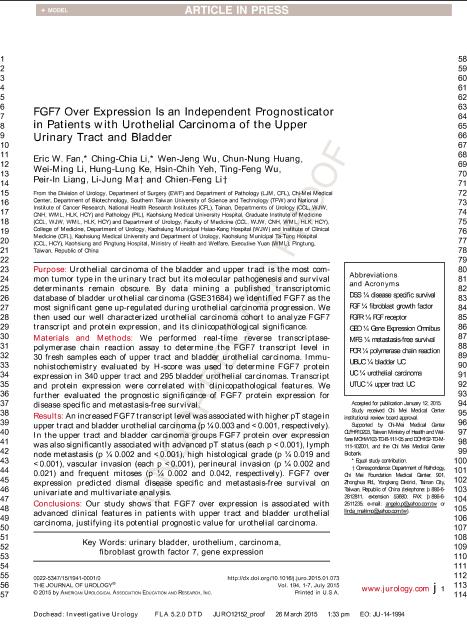
Purpose Urothelial carcinoma of the bladder and upper tract is the most common tumor type in the urinary tract but its molecular pathogenesis and survival determinants remain obscure. By data mining a published transcriptomic database of bladder urothelial carcinoma (GSE31684) we identified FGF7 as the most significant gene up-regulated during urothelial carcinoma progression. We then used our well characterized urothelial carcinoma cohort to analyze FGF7 transcript and protein expression, and its clinicopathological significance. Materials and Methods We performed real-time reverse transcriptase-polymerase chain reaction assay to determine the FGF7 transcript level in 30 fresh samples each of upper tract and bladder urothelial carcinoma. Immunohistochemistry evaluated by H-score was used to determine FGF7 protein expression in 340 upper tract and 295 bladder urothelial carcinomas. Transcript and protein expression were correlated with clinicopathological features. We further evaluated the prognostic significance of FGF7 protein expression for disease specific and metastasis-free survival. Results An increased FGF7 transcript level was associated with higher pT stage in upper tract and bladder urothelial carcinoma (p = 0.003 and <0.001, respectively). In the upper tract and bladder carcinoma groups FGF7 protein over expression was also significantly associated with advanced pT status (each p <0.001), lymph node metastasis (p = 0.002 and <0.001), high histological grade (p = 0.019 and <0.001), vascular invasion (each p <0.001), perineural invasion (p = 0.002 and 0.021) and frequent mitoses (p = 0.002 and 0.042, respectively). FGF7 over expression predicted dismal disease specific and metastasis-free survival on univariate and multivariate analysis. Conclusions Our study shows that FGF7 over expression is associated with advanced clinical features in patients with upper tract and bladder urothelial carcinoma, justifying its potential prognostic value for urothelial carcinoma.

Changes in the Intestinal Microbiome and Alcoholic and Nonalcoholic Liver Diseases: Causes or Effects?
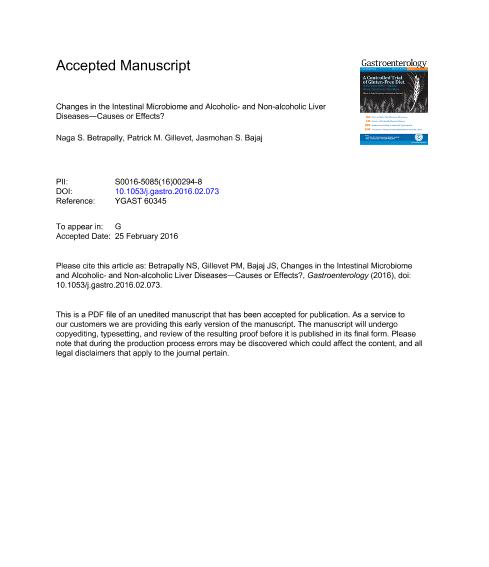
The prevalence of fatty liver diseases is increasing rapidly worldwide; after treatment of hepatitis C virus infection becomes more widespread, fatty liver diseases are likely to become the most prevalent liver disorders. Although fatty liver diseases are associated with alcohol, obesity, and the metabolic syndrome, their mechanisms of pathogenesis are not clear. The development and progression of fatty liver, alcoholic, and nonalcoholic liver disease (NAFLD) all appear to be influenced by the composition of the microbiota. The intestinal microbiota have been shown to affect precirrhotic and cirrhotic stages of liver diseases, which could lead to new strategies for their diagnosis, treatment, and study. We review differences and similarities in the cirrhotic and precirrhotic stages of NAFLD and alcoholic liver disease. Differences have been observed in these stages of alcohol-associated disease in patients who continue to drink compared with those who stop, with respect to the composition and function of the intestinal microbiota and intestinal integrity. NAFLD and the intestinal microbiota also differ between patients with and without diabetes. We also discuss the potential of microbial therapy for patients with NAFLD and ALD.

Evaluation of response after neoadjuvant treatment in soft tissue sarcomas; the European Organization for Research and Treatment of Cancer–Soft Tissue and Bone Sarcoma Group (EORTC–STBSG) recommendations for pathological examination and reporting
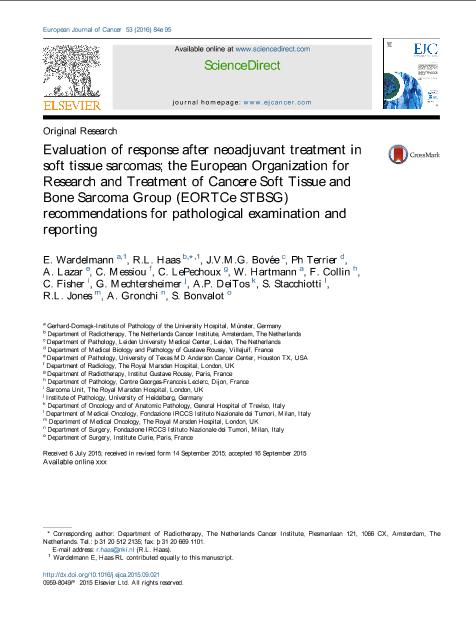
Abstract At present, there is not a commonly used and generally accepted standardized approach for the pathologic evaluation of pretreated soft tissue sarcomas. Also, it is still unclear whether the cut-off for prognostic relevance is similar in the many different histological subtypes of STS. This manuscript, produced by a European Organization for Research and Treatment of Cancer – Soft Tissue and Bone Sarcoma Group (EORTC–STBSG) endorsed task force, aims to propose standardization of the pathological examination process and the reporting of STS resection specimens after neoadjuvant radio- and/or chemotherapy.

P0192 Sentinel node biopsy in breast cancer using only methylene blue dye: A prospective study in a rural tertiary care centre
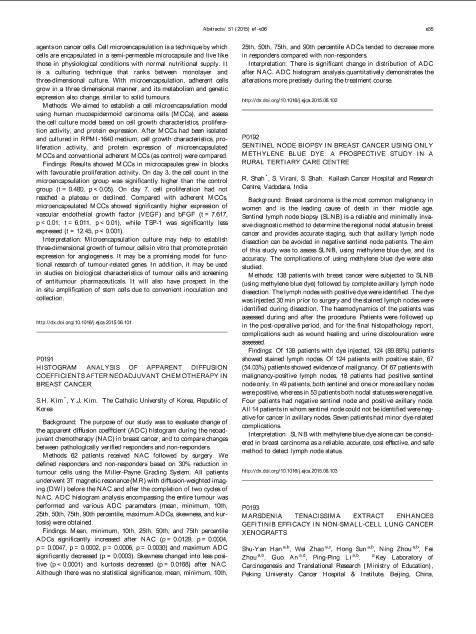
Background Breast carcinoma is the most common malignancy in women and is the leading cause of death in their middle age. Sentinel lymph node biopsy (SLNB) is a reliable and minimally invasive diagnostic method to determine the regional nodal status in breast cancer and provides accurate staging, such that axillary lymph node dissection can be avoided in negative sentinel node patients. The aim of this study was to assess SLNB, using methylene blue dye, and its accuracy. The complications of using methylene blue dye were also studied. Methods 138 patients with breast cancer were subjected to SLNB (using methylene blue dye) followed by complete axillary lymph node dissection. The lymph nodes with positive dye were identified. The dye was injected 30 min prior to surgery and the stained lymph nodes were identified during dissection. The haemodynamics of the patients was assessed during and after the procedure. Patients were followed up in the post-operative period, and for the final histopathology report, complications such as wound healing and urine discolouration were assessed. Findings Of 138 patients with dye injected, 124 (89.85%) patients showed stained lymph nodes. Of 124 patients with positive stain, 67 (54.03%) patients showed evidence of malignancy. Of 67 patients with malignancy-positive lymph nodes, 18 patients had positive sentinel node only. In 49 patients, both sentinel and one or more axillary nodes were positive, whereas in 53 patients both nodal statuses were negative. Four patients had negative sentinel node and positive axillary node. All 14 patients in whom sentinel node could not be identified were negative for cancer in axillary nodes. Seven patients had minor dye-related complications. Interpretation SLNB with methylene blue dye alone can be considered in breast carcinoma as a reliable, accurate, cost effective, and safe method to detect lymph node status.

The Next Generation of Clinical Decision Making Tools: Development of a Real-Time Prediction Tool for Outcome of Prostate Biopsy in Response to a Continuously Evolving Prostate Cancer Landscape
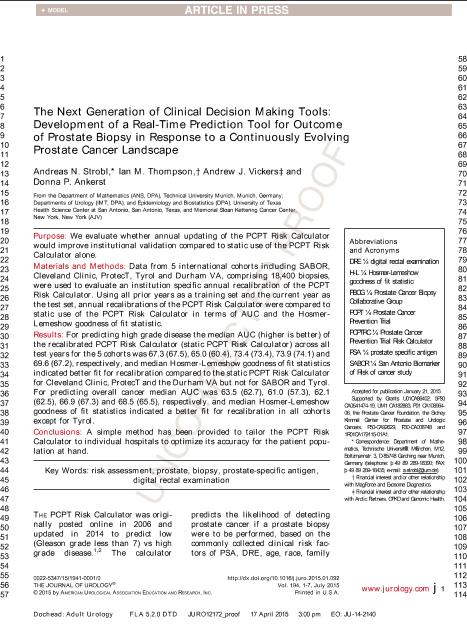
Purpose We evaluate whether annual updating of the PCPT Risk Calculator would improve institutional validation compared to static use of the PCPT Risk Calculator alone. Materials and Methods Data from 5 international cohorts including SABOR, Cleveland Clinic, ProtecT, Tyrol and Durham VA, comprising 18,400 biopsies, were used to evaluate an institution specific annual recalibration of the PCPT Risk Calculator. Using all prior years as a training set and the current year as the test set, annual recalibrations of the PCPT Risk Calculator were compared to static use of the PCPT Risk Calculator in terms of AUC and the Hosmer-Lemeshow goodness of fit statistic. Results For predicting high grade disease the median AUC (higher is better) of the recalibrated PCPT Risk Calculator (static PCPT Risk Calculator) across all test years for the 5 cohorts was 67.3 (67.5), 65.0 (60.4), 73.4 (73.4), 73.9 (74.1) and 69.6 (67.2), respectively, and median Hosmer-Lemeshow goodness of fit statistics indicated better fit for recalibration compared to the static PCPT Risk Calculator for Cleveland Clinic, ProtecT and the Durham VA but not for SABOR and Tyrol. For predicting overall cancer median AUC was 63.5 (62.7), 61.0 (57.3), 62.1 (62.5), 66.9 (67.3) and 68.5 (65.5), respectively, and median Hosmer-Lemeshow goodness of fit statistics indicated a better fit for recalibration in all cohorts except for Tyrol. Conclusions A simple method has been provided to tailor the PCPT Risk Calculator to individual hospitals to optimize its accuracy for the patient population at hand.

External Validation of Bladder Cancer Predictive Nomograms for Recurrence, Cancer-Free Survival and Overall Survival following Radical Cystectomy
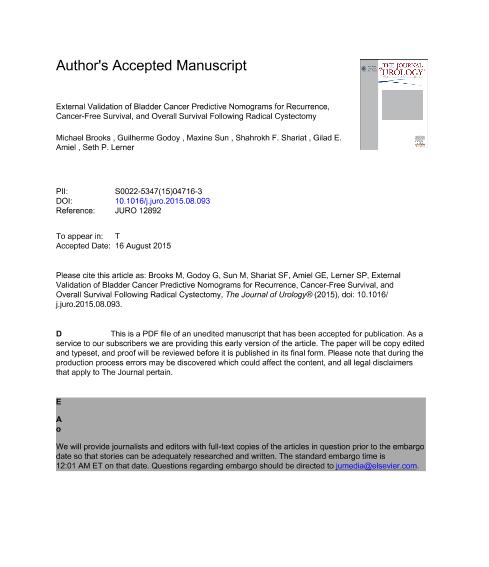
Purpose We externally validated 3 previously published nomograms to predicting recurrence, and cancer specific and overall survival following radical cystectomy and pelvic lymph node dissection for urothelial carcinoma of the bladder. Materials and Methods Two surgeons from a single institution performed a total of 197 consecutive radical cystectomies and pelvic lymph node dissections for bladder cancer from January 2003 to September 2009. A total of 23 patients were excluded from analysis. Examined parameters were those used in the original nomograms, including patient age, gender, pathological T stage, N stage, tumor grade, presence of carcinoma in situ and lymphovascular invasion, neoadjuvant chemotherapy, adjuvant chemotherapy and adjuvant radiation therapy. Nomogram predictions were compared to actuarial outcomes and predictive accuracy was quantified using measures of discrimination and calibration. Results At the time of analysis 34 patients had experienced recurrence, of whom 28 died of disease and 6 were currently alive with disease. Discrimination at 2, 5 and 8 years was 0.776, 0.809 and 0.794 for recurrence, 0.822, 0.840 and 0.849 for cancer specific survival, and 0.812, 0.820 and 0.825, respectively, for overall survival. Calibration plots revealed nomogram overestimation of all 3 end points. Conclusions Nomograms for bladder cancer recurrence, cancer specific survival and overall survival following radical cystectomy and pelvic lymph node dissection performed well in our series with accuracy comparable to that in the original series. The use of nomogram predictions should be further explored in clinical trials to assess the impact on patient care in clinical practice.

Genetic Diversity of Pancreatic Ductal Adenocarcinoma and Opportunities for Precision Medicine
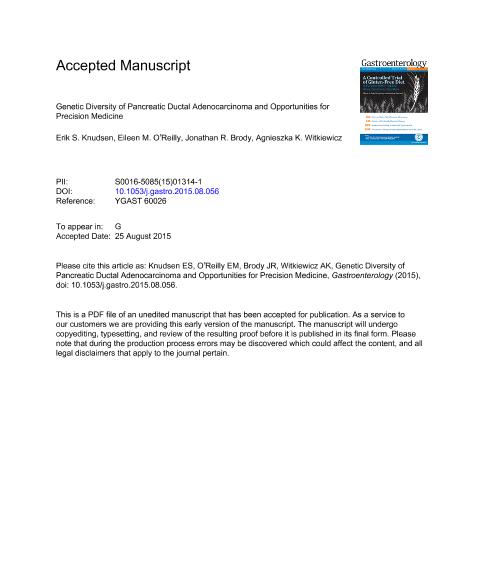
Patients with pancreatic ductal adenocarcinoma (PDA) have a poor prognosis despite new treatments; approximately 7% survive for 5 years. Although there have been advances in systemic, primarily cytotoxic, therapies, it has been a challenge to treat patients with PDA using targeted therapies. Sequence analyses have provided a wealth of information about the genetic features of PDA and have identified potential therapeutic targets. Preclinical and early-phase clinical studies have found specific pathways could be rationally targeted; it might also be possible to take advantage of the genetic diversity of PDAs to develop therapeutic agents. The genetic diversity and instability of PDA cells have long been thought of as obstacles to treatment, but are now considered exploitable features. We review the latest findings in pancreatic cancer genetics and the promise of targeted approaches in PDA therapy.

Unconventional Bladder Preservation: Factors Predicting Failure to Receive Definitive Surgery following Chemotherapy for Nonmetastatic Muscle Invasive Bladder Cancer in the National Cancer Database
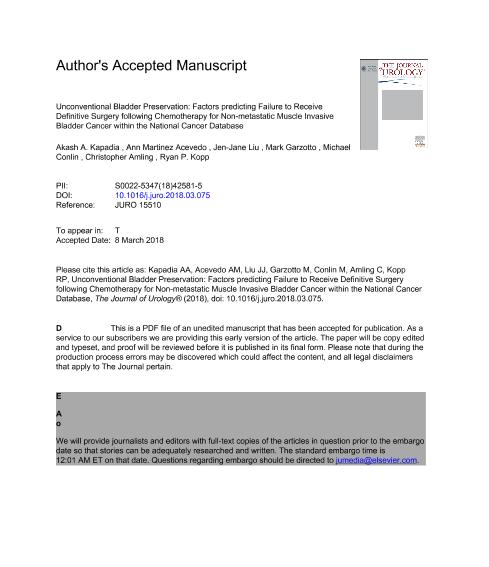
Purpose Neoadjuvant chemotherapy is an important adjunct to cystectomy for managing muscle invasive bladder cancer. Using the National Cancer Database we investigated factors that predict failure to undergo surgery following multi-agent chemotherapy for nonmetastatic muscle invasive bladder cancer. Materials and Methods We performed a cohort study in patients diagnosed with cT2-4aN0M0 urothelial cell carcinoma of the bladder between 2004 and 2013 who underwent multi-agent chemotherapy. We excluded those with surgery prior to chemotherapy, clinical T4b disease and those who received radiotherapy. Socioeconomic and clinical predictors, including time from diagnosis to treatment, were analyzed using logistic regression for the receipt of surgery after chemotherapy. Cox proportional hazards modeling was applied to perform time dependent analysis. Results Of the 4,640 patients who met our study inclusion and exclusion criteria 4,244 (91%) proceeded to surgery. Negative predictors of surgery included African American or Hispanic race (OR 0.58, p = 0.007 and 0.48, p = 0.002, respectively), increasing age (OR 0.44, p <0.001) and greater time between diagnosis and chemotherapy initiation (fourth quartile greater than 59 days, OR 0.51, p <0.001). African American race (HR 0.79, p <0.001), Medicare (HR 0.86, p <0.001) and other government insurance (HR 0.73, p <0.001) were associated with delayed chemotherapy. Conclusions Increasing age, African American or Hispanic race and longer time to chemotherapy predicted failure to undergo surgery. Furthermore, African American race was associated with delayed chemotherapy. Chemotherapy was also delayed in patients on Medicare or other government insurance. Longer time to neoadjuvant chemotherapy is a modifiable risk factor that should be closely observed in multimodal cancer treatment.

Regional and inter-hospital differences in the utilisation of liver surgery for patients with synchronous colorectal liver metastases in the Netherlands
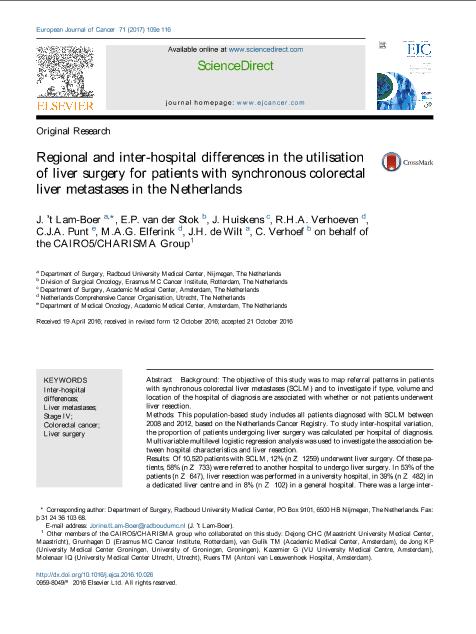
Abstract Background The objective of this study was to map referral patterns in patients with synchronous colorectal liver metastases (SCLM) and to investigate if type, volume and location of the hospital of diagnosis are associated with whether or not patients underwent liver resection. Methods This population-based study includes all patients diagnosed with SCLM between 2008 and 2012, based on the Netherlands Cancer Registry. To study inter-hospital variation, the proportion of patients undergoing liver surgery was calculated per hospital of diagnosis. Multivariable multilevel logistic regression analysis was used to investigate the association between hospital characteristics and liver resection. Results Of 10,520 patients with SCLM, 12% (n = 1259) underwent liver surgery. Of these patients, 58% (n = 733) were referred to another hospital to undergo liver surgery. In 53% of the patients (n = 647), liver resection was performed in a university hospital, in 39% (n = 482) in a dedicated liver centre and in 8% (n = 102) in a general hospital. There was a large inter-hospital variation in the proportion of patients undergoing liver resection (2–26%). In a multilevel logistic regression model, the odds of undergoing liver surgery were higher when patients were diagnosed in hospitals where liver surgery was performed compared with the general hospitals (dedicated liver centre: odds ratio 1.36 [95% confidence intervals 1.08–1.70], university hospital: odds ratio 1.69 [95% confidence intervals 1.22–2.34]). Conclusion There is a large inter-hospital and inter-regional variation in the utilisation of liver resection. Patients diagnosed with SCLM in expert centres had a higher chance of undergoing liver resection.

{{item.title}}
![]()
{{item.summary}}












